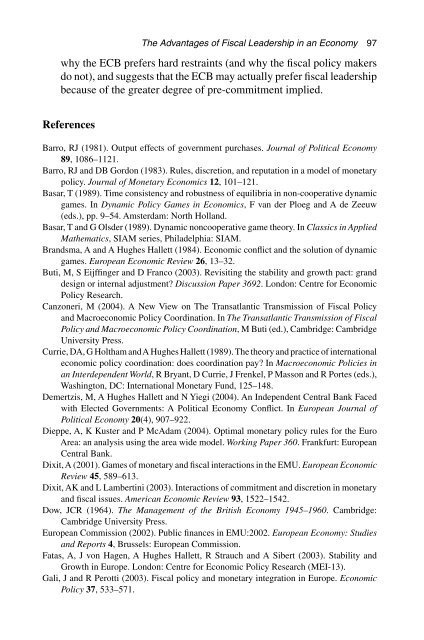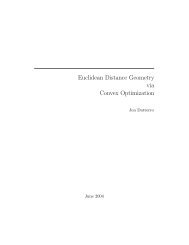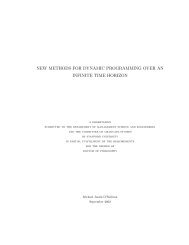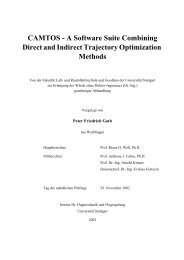Economic Models - Convex Optimization
Economic Models - Convex Optimization
Economic Models - Convex Optimization
You also want an ePaper? Increase the reach of your titles
YUMPU automatically turns print PDFs into web optimized ePapers that Google loves.
The Advantages of Fiscal Leadership in an Economy 97<br />
why the ECB prefers hard restraints (and why the fiscal policy makers<br />
do not), and suggests that the ECB may actually prefer fiscal leadership<br />
because of the greater degree of pre-commitment implied.<br />
References<br />
Barro, RJ (1981). Output effects of government purchases. Journal of Political Economy<br />
89, 1086–1121.<br />
Barro, RJ and DB Gordon (1983). Rules, discretion, and reputation in a model of monetary<br />
policy. Journal of Monetary <strong>Economic</strong>s 12, 101–121.<br />
Basar, T (1989). Time consistency and robustness of equilibria in non-cooperative dynamic<br />
games. In Dynamic Policy Games in <strong>Economic</strong>s, F van der Ploeg and A de Zeeuw<br />
(eds.), pp. 9–54. Amsterdam: North Holland.<br />
Basar, T and G Olsder (1989). Dynamic noncooperative game theory. In Classics in Applied<br />
Mathematics, SIAM series, Philadelphia: SIAM.<br />
Brandsma, A and A Hughes Hallett (1984). <strong>Economic</strong> conflict and the solution of dynamic<br />
games. European <strong>Economic</strong> Review 26, 13–32.<br />
Buti, M, S Eijffinger and D Franco (2003). Revisiting the stability and growth pact: grand<br />
design or internal adjustment? Discussion Paper 3692. London: Centre for <strong>Economic</strong><br />
Policy Research.<br />
Canzoneri, M (2004). A New View on The Transatlantic Transmission of Fiscal Policy<br />
and Macroeconomic Policy Coordination. In The Transatlantic Transmission of Fiscal<br />
Policy and Macroeconomic Policy Coordination, M Buti (ed.), Cambridge: Cambridge<br />
University Press.<br />
Currie, DA, G Holtham andA Hughes Hallett (1989). The theory and practice of international<br />
economic policy coordination: does coordination pay? In Macroeconomic Policies in<br />
an Interdependent World, R Bryant, D Currie, J Frenkel, P Masson and R Portes (eds.),<br />
Washington, DC: International Monetary Fund, 125–148.<br />
Demertzis, M, A Hughes Hallett and N Yiegi (2004). An Independent Central Bank Faced<br />
with Elected Governments: A Political Economy Conflict. In European Journal of<br />
Political Economy 20(4), 907–922.<br />
Dieppe, A, K Kuster and P McAdam (2004). Optimal monetary policy rules for the Euro<br />
Area: an analysis using the area wide model. Working Paper 360. Frankfurt: European<br />
Central Bank.<br />
Dixit,A (2001). Games of monetary and fiscal interactions in the EMU. European <strong>Economic</strong><br />
Review 45, 589–613.<br />
Dixit, AK and L Lambertini (2003). Interactions of commitment and discretion in monetary<br />
and fiscal issues. American <strong>Economic</strong> Review 93, 1522–1542.<br />
Dow, JCR (1964). The Management of the British Economy 1945–1960. Cambridge:<br />
Cambridge University Press.<br />
European Commission (2002). Public finances in EMU:2002. European Economy: Studies<br />
and Reports 4, Brussels: European Commission.<br />
Fatas, A, J von Hagen, A Hughes Hallett, R Strauch and A Sibert (2003). Stability and<br />
Growth in Europe. London: Centre for <strong>Economic</strong> Policy Research (MEI-13).<br />
Gali, J and R Perotti (2003). Fiscal policy and monetary integration in Europe. <strong>Economic</strong><br />
Policy 37, 533–571.
















